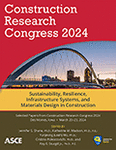A Transition Management Framework for Implementing Circular Economy in the Construction Industry
Publication: Construction Research Congress 2024
ABSTRACT
Construction contributes to around half of global material consumption and solid waste generation. Transitioning to a circular economy is a potential solution to mitigate negative environmental externalities. Nonetheless, this transition is challenged by various technical and socio-economic factors. To identify a viable path for a circular economy transition, the overarching objective of this research was to build on transition theory and identify drivers, motivations, challenges, and efforts in shifting to a circular economy in the construction industry. For this purpose, semi-structured interviews were conducted with representatives from 13 construction companies in North America and Europe, including owners, contractors, and manufacturers, who are actively implementing circular economy principles. Interview findings were summarized, and a four-step transition management cycle framework for the transition to a circular economy in the construction sector was proposed. Findings are useful in managing the transition from a linear to a circular model in the construction sector.
Get full access to this article
View all available purchase options and get full access to this chapter.
REFERENCES
Adabre, M. A., Chan, A. P. C., Darko, A., and Hosseini, M. R. (2022). Facilitating a transition to a circular economy in construction projects: intermediate theoretical models based on the theory of planned behaviour. Building Research and Information, 0(0), 1–20. https://doi.org/10.1080/09613218.2022.2067111.
Benachio, G. L. F., Freitas, M. D. C. D., and Tavares, S. F. (2020). Circular economy in the construction industry: A systematic literature review. Journal of Cleaner Production, 260, 121046. https://doi.org/10.1016/j.jclepro.2020.121046.
Corbin, J., and Strauss, A. (2015). Basics of Qualitative Research. SAGE Publication.
Costantino, N. (2006). The contribution of Ranko Bon to the debate on sustainable construction. Construction Management and Economics, 24(7), 705–709. https://doi.org/10.1080/01446190500127203.
De Jesus, A., and Mendonça, S. (2018). Lost in Transition? Drivers and Barriers in the Eco-innovation Road to the Circular Economy. Ecological Economics, 145(September 2017), 75–89. https://doi.org/10.1016/j.ecolecon.2017.08.001.
Ellen MacArthur Foundation. (2013). Towards The Circular Economy - Economic and business rationale for an accelerted tranisiton (Vol. 1).
Ellen MacArthur Foundation. (2020). What is the Circular Economy. https://www.ellenmacarthurfoundation.org/circular-economy/what-is-the-circular-economy.
EPA. (2020). Advancing Sustainable Materials Management: 2018 Fact Sheet (Issue December).
Geissdoerfer, M., Savaget, P., Bocken, N. M. P., and Hultink, E. J. (2017). The Circular Economy – A new sustainability paradigm? Journal of Cleaner Production, 143, 757–768. https://doi.org/10.1016/j.jclepro.2016.12.048.
Guerra, B. C., Shahi, S., Mollaei, A., Skaf, N., Weber, O., Leite, F., and Haas, C. (2021). Circular economy applications in the construction industry: A global scan of trends and opportunities. Journal of Cleaner Production, 324(September), 129125. https://doi.org/10.1016/j.jclepro.2021.129125.
Harte, M. J. (1995). Ecology, sustainability, and environment as capital. Ecological Economics, 15(2), 157–164. https://doi.org/10.1016/0921-8009(95)00043-7.
Kemp, R., Loorbach, D., and Rotmans, J. (2007). Transition management as a model for managing processes of co-evolution towards sustainable development. International Journal of Sustainable Development and World Ecology, 14(1), 78–91. https://doi.org/10.1080/13504500709469709.
Kirchherr, J., Piscicelli, L., Bour, R., Kostense-Smit, E., Muller, J., Huibrechtse-Truijens, A., and Hekkert, M. (2018). Barriers to the Circular Economy: Evidence From the European Union (EU). Ecological Economics, 150(April), 264–272. https://doi.org/10.1016/j.ecolecon.2018.04.028.
Linder, M., and Williander, M. (2017). Circular Business Model Innovation: Inherent Uncertainties. Business Strategy and the Environment, 26(2), 182–196. https://doi.org/10.1002/bse.1906.
Loorbach, D. (2010). Transition management for sustainable development: A prescriptive, complexity-based governance framework. Governance, 23(1), 161–183. https://doi.org/10.1111/j.1468-0491.2009.01471.x.
Lovins, L. H., Wallis, S., Wijkman, A., and Fullerton, J. (2018). A Finer Future - Creating and Economy in Service to Life. New Society Publishers.
Nußholz, J. L. K., Nygaard Rasmussen, F., and Milios, L. (2019). Circular building materials: Carbon saving potential and the role of business model innovation and public policy. Resources, Conservation and Recycling, 141(October 2018), 308–316. https://doi.org/10.1016/j.resconrec.2018.10.036.
Ofori, G. (1998). Sustainable construction: Principles and a framework for attainment - Comment. Construction Management and Economics, 16(2), 141–145. https://doi.org/10.1080/014461998372448.
Otter. [Computer Software]. (2021). Retrieved from https://otter.ai/.
Rizos, V., et al. (2016). Implementation of circular economy business models by small and medium-sized enterprises (SMEs): Barriers and enablers. Sustainability (Switzerland), 8(11). https://doi.org/10.3390/su8111212.
Sanchez, B., and Haas, C. (2018). A novel selective disassembly sequence planning method for adaptive reuse of buildings. Journal of Cleaner Production, 183, 998–1010. https://doi.org/10.1016/j.jclepro.2018.02.201.
Vinante, C., Sacco, P., Orzes, G., and Borgianni, Y. (2021). Circular economy metrics: Literature review and company-level classification framework. Journal of Cleaner Production, 288, 125090.
Vinnari, M., and Vinnari, E. (2014). A Framework for Sustainability Transition: The Case of Plant-Based Diets. Journal of Agricultural and Environmental Ethics, 27(3), 369–396. https://doi.org/10.1007/s10806-013-9468-5.
WEF. (2014). Towards the Circular Economy: Accelerating the scale-up across global supply chains (Issue January).
Information & Authors
Information
Published In
History
Published online: Mar 18, 2024
Authors
Metrics & Citations
Metrics
Citations
Download citation
If you have the appropriate software installed, you can download article citation data to the citation manager of your choice. Simply select your manager software from the list below and click Download.
